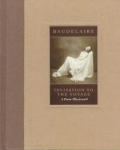Rhythmic and compelling, "Do Not Go Gentle Into That Good Night" is a poem that gets into one's head and takes up residence.
"Do Not Go Gentle Into That Good Night" by Dylan Thomas
Do not go gentle into that good night,The Academy of American Poets page on the poem includes the full text as well as an audio clip of someone (I presume Thomas himself) reading the poem.
Old age should burn and rave at close of day;
Rage, rage against the dying of the light.
Though wise men at their end know dark is right,
Because their words had forked no lightning they
Do not go gentle into that good night.
Good men, the last wave by, crying how bright
Their frail deeds might have danced in a green bay,
Rage, rage against the dying of the light.
Wild men who caught and sang the sun in flight,
And learn, too late, they grieved it on its way,
Do not go gentle into that good night.
Grave men, near death, who see with blinding sight
Blind eyes could blaze like meteors and be gay,
Rage, rage against the dying of the light.
And you, my father, there on the sad height,
Curse, bless, me now with your fierce tears, I pray.
Do not go gentle into that good night.
Rage, rage against the dying of the light.


 One of the few poetry books I own is
One of the few poetry books I own is 
